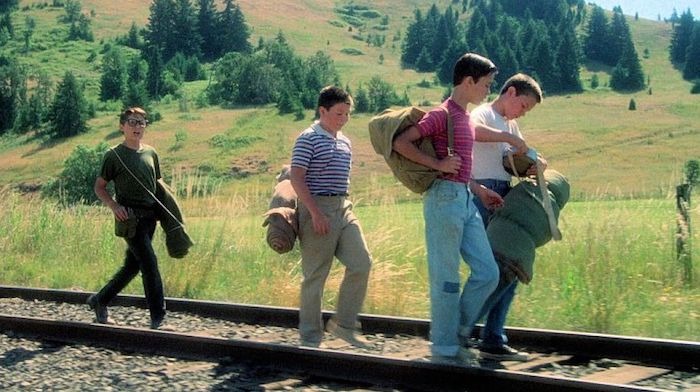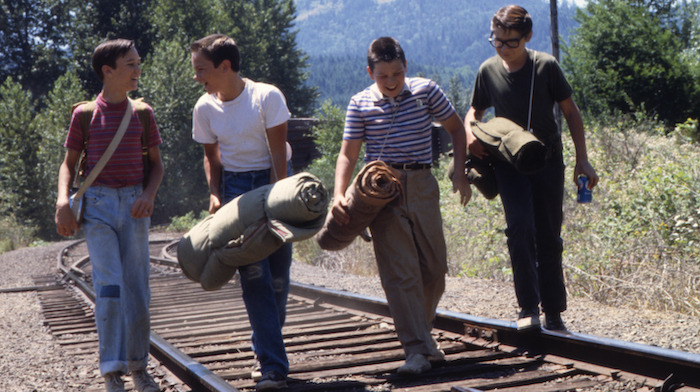35 Years Of 'Stand By Me' And The Legend Of River Phoenix
It's been 35 years since Stand By Me, Rob Reiner's adaptation of a novella by Stephen King, was released in theaters and almost immediately became a classic. The coming-of-age tale of a quartet of teenage boys in 1950s Oregon who go on an adventure to find a dead body has cast a vast shadow across film since its premiere. Its influence can be found in everything from Boyz n the Hood to The Simpsons to Stranger Things. King declared it to be the first successful film translation of any of his works, which is a high honor given the presence of Brian de Palma's Carrie and Stanley Kubrick's The Shining. Few films, even over three decades later, tap so thoroughly into the abrasive and petulant power of pre-adolescent freedom. It's a story of growing up and the fear of doing so, that moment in your invincible youth when you realize that it won't last forever.
And at its heart is a quartet of performances that helped to redefine the child star of the '80s: the fragile cockiness of Corey Feldman, the earnest naivety of Jerry O'Connell, the bruised sensitivity of Wil Wheaton, and, of course, the prodigal charisma of River Phoenix.
"Our Kids Could Captivate the World"
While Phoenix had already made his movie debut and had several TV appearances under his belt before he appeared in Stand By Me, it was this film that heralded the arrival of a once-in-a-generation talent. Soon, he was being sold to the world as one to watch, not your usual child star. One of five kids, each with colorful names (River, Rain, Joaquin/Leaf, Liberty, and Summer), and raised semi-nomadic before descending on Hollywood, Phoenix was an irresistible kind of celebrity in the yuppie era of excess and uber-polished personas. In interviews, Phoenix's parents would say, "We'd had the vision that our kids could captivate the world," as the siblings performed in talent contests and caught the eye of casting agents. With Stand By Me, that vision came to life in a big way, and soon ushered in the era of Phoenix as his generation's most beloved actor. It was an era that tragically ended prematurely, after Phoenix died in 1993 of an accidental drug overdose at the age of 23.
It seems impossible to talk about River Phoenix as an actor without discussing him as an icon of youthful tragedy. His name pops up on practically every clickbait list dedicated to leering over the celebrities who died before their time. Rufus Wainwright wrote a song about him, lamenting the death of a matinee idol. His younger brother Joaquin, who's done a bit of acting over the years, is still incessantly asked about River's death and endlessly portrayed as a tortured soul because of it. Pop culture has a grand fetish for beloved geniuses who died prematurely, from Buddy Holly to Kurt Cobain to Amy Winehouse, and Phoenix will forever be embedded in that narrative. It's not hard to see how we got to this place, but it is a shame that this unbearable pain has irrevocably skewed how we understand Phoenix's work.
Of course, it's not as though these compromising perspectives weren't present when he was alive either. From his earliest introduction in Hollywood, Phoenix was defined as something of a curiosity. Where the child stars of old were impeccably polished dolls under the thumb of the studio system and tap-dancing for their lives, the Phoenix kids were unruly hippies of unreal talent, plucked from nowhere and shoved into the spotlight. The story of his unusual upbringing was as inescapable in interviews as description of his prodigious acting skills. A 1986 interview from People heralded the teenager as "an independent spirit" free of slick styling or training, while Rob Reiner said that his parents "have somehow managed to maintain what was pure and good about the '60s morality and make it work."
Reiner's warmly encouraging stance, however, was a rare one in the media cycle. His hippie nature was often mocked, such as during an interview on Donahue when the very mention of his siblings' names made the audience guffaw with laughter. A Movieline journalist wondered if "the poor kid" Phoenix had been "raised by the Keebler elves or just domineering parents masquerading as flower children? Jimmy Connors, Brooke Shields, and Patti Davis survived domineering parents. Jesus, Hamlet, and Hitler didn't fare as well. Which way did River fall?" After his death, his ardent veganism and environmentalist activism were spun as simultaneously godlike and a symbol of hypocrisy: how could Hollywood's most famous earth child die of a drug overdose?
Most journalists also seemed somewhat horrified by Phoenix's upbringing, especially once it became common knowledge that he spent part of his childhood in the Children of God cult. Now known as The Family International, the group preached an explicitly sexual approach to spirituality that included a proselytizing method called Flirty Fishing, which encouraged female members to "show God's love" to potential converts through sex. The Children of God has faced countless accusations of child sex abuse. In an interview with Details magazine in November 1991, Phoenix stated, in his words, that he first "made love" at the age of four while in the Children of God, but he'd "blocked it out" (in 2019, Joaquin Phoenix claimed that River was joking when he said this "because he was so tired of being asked ridiculous questions by the press.")
The Closure of the Past
Nowadays, it's not tough to see why so many people seem eager to hold up Stand By Me as a kind of cinematic confession from a young Phoenix. As Chris Chambers, the de facto leader of the group, he is instantly magnetic, an ideal display of the talent that made the teenager a star. With short hair and a baby Brando-esque sneer, complete with a pack of cigarettes rolled up in his t-shirt arm, he commanded attention. He takes charge in a way that his friends instantly agree with, perhaps because he just seems so much more mature than they are. Even as a kid, Phoenix had the aura of maturity around him that elevated him beyond his cutesy tween contemporaries. Beneath that cocky demeanour, however, is a damaged kid seen by his small town as tainted goods thanks to his troubled family. In arguably the film's most affecting scene, Chris breaks down as he admits to the unbearable pressure of being known as an irredeemable brat who's going nowhere in life beyond his own doom. For all of his seeming self-assuredness, in that moment, you see Chris as the child that he is, and how desperate he is for someone to lean on.
As Stand By Me proves, the rose-tinted glasses of nostalgia can only conceal so much. One of Stephen King's greatest talents as a writer, especially of horror fiction, is in how he exposes the absolute hopelessness of childhood. The so-called best years of your life are more often than not the most torrid and dangerous. The bullies are knife-wielding maniacs. The parents are absent or neglectful or too wrapped up in their own business to care about their kids going on a quest to find a corpse. And in the end, that dead body they were so eager to discover, for hopes of fortune and glory, is the ultimate wake-up call. You can gloss over a lot of the strangeness and inappropriate moments of your youth, but not death itself. Seven years after the film premiered, Phoenix was dead. Like Chris Chambers, as the film's closing moments inform us, he died too soon.
Death tends to be a demystifying process, particularly if one passes in an unexpected manner, but Phoenix's legend has only grown in stature since 1993. He's an almost mythic figure in Hollywood, the actor who could have been the greatest in another timeline. The handful of films we got from him are dissected over and over again for some sort of secret sign. We look at those performances and cannot help but speculate on what might have been. Would he be acting in the roles that would go to Leonardo DiCaprio, Ethan Hawke, and his own brother? More than any other title in his filmography, Stand By Me is the film that has enshrined Phoenix's image in cinematic amber. It's the movie that centers him as a remarkable youth from whom the world wants everything. That image of him, forever young and with everything ahead of him, is one that his fans cling to. We'll never know what could have been and so we turn to the closure of the past.


